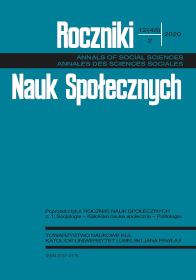On the Birth of Economic Science During the Italian-Scottish Enlightenment: Two Paradigms Compared
Abstrakt
O narodzinach nauk ekonomicznych w okresie włoskiego i szkockiego oświecenia: porównanie dwóch paradygmatów
Autor artykułu postawił sobie dwa cele. Po pierwsze, proponuje analizę porównawczą dwóch głównych paradygmatów ekonomicznych funkcjonujących w okresie oświecenia, tzn. paradygmatu ekonomii politycznej kojarzonego z Adamem Smithem i ekonomii obywatelskiej związanej z osobą Antonia Genovesiego. Po drugie, autor podaje przyczyny, dla których w ostatnim ćwierćwieczu paradygmat ekonomii obywatelskiej zyskuje na popularności. W końcowej części artykułu autor przedstawia przemyślenia na temat najpoważniejszych wad libertariańskiego indywidualizmu obserwowanego współcześnie.
Bibliografia
Adam Smith as Theologian, edited by Paul Oslington. New York: Taylor & Francis, 2011.
Agamben, Giorgio. The Kingdom and the Glory. For a Theological Genealogy of Economy and Government. Stanford: Stanford University Press, 2011.
Bentham, Jeremy. An Introduction to the Principles of Morals and Legislation. Kitchener: Batoche Books, 2000.
Bobbio, Norbert. Destra e Sinistra. Rome: Donzelli, 1999.
Bruni, Luigino, and Robert Sugden. “Fraternity: why the market need not be a morally free zone.” Economics and Philosophy 24, no. 1 (2008): 35–64.
Bruni, Luigino, and Stefano Zamagni. Economics and Theology in Italy Since the 18th Century. In The Oxford Handbook of Christianity and Economics, edited by Paul Oslington, 57–74. Oxford: Oxford University Press, 2014.
Caritat de Condorcet, Marie J.A.N. Esquisse d’un tableau historique des progress de l’esprit humain. Torino: Einaudi, 1969.
Dizionario di Economia Civile, edited by Luigino Bruni, and Stefano Zamagni. Rome: Città Nuova, 2009. 57–74.
Hill, Lisa. “Further Reflections on the Hidden Theology of Adam Smith.” The European Journal of the History of Economic Thought 11, no. 4 (2004): 629–35.
Montes, Leonidas. “The Adam Smith Problem,” Journal of the History of Economic Thought 25, no. 1 (2003): 63–90.
Pabst, Adrian. “Political Economy of Virtue: Genovesi’s Civil Economy Alternative to Modern Economic Thought.” International Review of Economics 14 (2005): 582–604.
Paganelli, Mario. “The Adam Smith Problem in Reverse.” History of Political Economy 40, no. 2 (2008): 365–82.
Sandel, Michael. Giustizia. Il nostro bene comune. Milan: Feltrinelli, 2010.
Screpanti, Ernesto, and Stefano Zamagni. A Profile of History of Economic Thought. Oxford: Oxford University Press, 2004.
Sen, Amartya. An Idea of Justice. Cambridge: Harvard University Press, 2009.
Smith, Adam. An Inquiry into the Nature and Causes of the Wealth of Nations, edited by Sálvio M. Soares, 16. Amsterdam–Lausanne–Melbourne–Milan–New York–São Paulo: MetaLibri Digital Library, 2007.
Smith, Adam. The Theory of Moral Sentiments. Cambridge: Cambridge University Press, 2012.
Waterman, Anthony. M. “Economics as theology: Adam Smith’s Wealth of Nations.” Southern Economic Journal 68, no. 4 (2002): 907–21.
Zamagni, Stefano. “Catholic Social Thought, Civil Economy and the Spirit of Capitalism.” In The True Wealth of Nations, edited by Daniel Finn, 63–94. Oxford: Oxford University Press, 2010.
Zamagni, Stefano. Impresa responsabile e mercato civile. Bologna: Il Mulino, 2013.
Zamagni, Stefano. “Disuguaglianza e giustizia benevolente.” In L’essere che è, l’essere che accade, edited by Carla Danani, and Benedetta Giovanola, 363–74. Milan: Vita e Pensiero, 2014.
Zamagni, Stefano. “L’economia civile come berillo intellettuale.” In Etica dell’economia, edited by Alessandro Biasini, and Carmelo Vigna, 149–70. Napoli: Orthotes, 2016.
Copyright (c) 2020 Roczniki Nauk Społecznych

Utwór dostępny jest na licencji Creative Commons Uznanie autorstwa – Użycie niekomercyjne – Bez utworów zależnych 4.0 Międzynarodowe.


